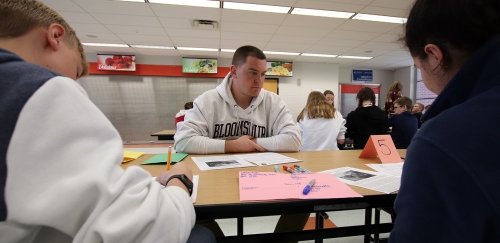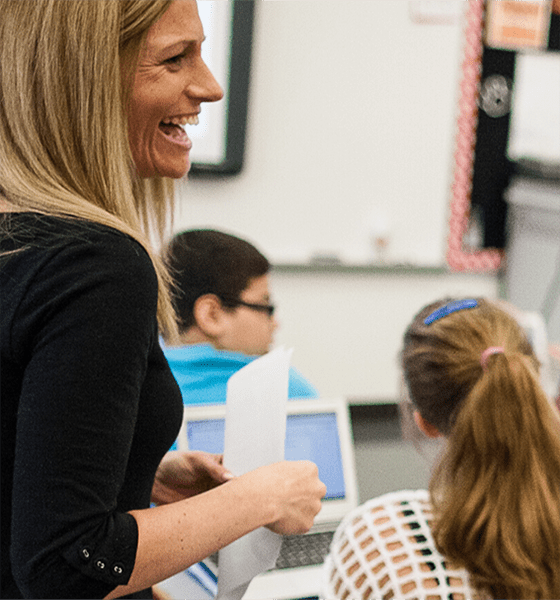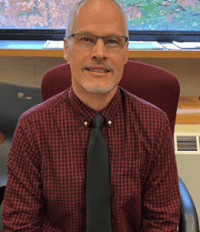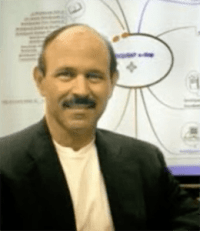
Secondary Education (7-12)
Here, we see heart as emotional intelligence; the kind needed to change the lives of students. We pair a strong foundation of knowledge with quality field experiences. From this, you'll leave with an understanding of effective classroom teaching and how to put ideas and research into practice.
- Degrees & Offerings
-
- B.S.Ed.
- Location
-
- Bloomsburg
- Lock Haven
- Mansfield
- Program Contact
-
Chair, Department of K-12, Health and Physical Education, Middle Level & Secondary Education
Major Showcase Day
Get a behind-the-scenes look at our program during the Major Showcase Day and do a deep dive on our Secondary Ed: Social Studies concentration on Thursday, April 24, 2025 on the Mansfield campus. Space is limited, register today!
You already have the heart.
Teachers have an impactful role in the life of developing young adults through mentoring, advocating and fostering learning. And as the learner develops, the teacher continues to be a big influence in the classroom as a role model and support mechanism. Not only do you become an expert in your thematic content area, but you learn to adapt in an ever-changing classroom environment so you can make a difference in the educational, social, emotional and behavioral well-being of learners - from the first class you ever teach to your last.
Let us show you how to inspire.
Our secondary education undergraduate program prepares students for licensure in grades 7-12 and successful completion of the licensure exam for certification to teach in secondary school settings. Students select a concentration in one of the following content areas:
- Business Education (through the Zeigler College of Business)
- Biology
- Chemistry
- Earth and Space Science
- English
- General Science
- Mathematics
- Physics
- Social Studies

Program Overview
- As a part of Secondary Education expectations, students are required to spend time viewing and analyzing the teaching and learning process that takes place in schools from freshman year through program completion. This also includes observations and assisting teachers in classrooms as well as implementation of student-designed plans in authentic classroom settings.
- The program culminates with a final year in which students will complete methodology and other pedagogical courses with embedded school experiences followed the next semester by the student teaching experience. Each of the Secondary Education degree programs are designed to allow students to add a few more credit hours to their programs of study and complete a double major within the discipline of the certification areas. For more information, contact the academic department chairpersons.
- Includes specialized training in non-academic barriers (social, emotional and mental health, suicide prevention) through the McDowell Institute for Teacher Excellence.
- Continue your climb in one of our graduate programs like the M.Ed. Reading, M.Ed. Special Education, M.S. School Counseling, M.S. Instructional Design and Technology, or M.Ed. Curriculum and Instruction. Our graduate programs can enhance your existing skills and knowledge as an secondary education major, increase your earning power, and prepare you for a leadership role in your field.
Course Delivery Format
Bloomsburg
Face-to-Face
Online
Hybrid
Lock Haven
Face-to-Face
Online
Hybrid
Mansfield
Face-to-Face
Online
Hybrid
Clearfield
Face-to-Face
Online
Hybrid
Courses and Curriculum
Note: Degree requirements effective for enrolled students beginning Fall 2023. All enrolled students, including matriculating students prior to Fall 2023, can review their degree program requirements and track progress to degree completion with our degree audit and advisement tool, Degree Works.
Degree Requirements Degree Works
Note: Degree requirements effective for enrolled students beginning Fall 2023. All enrolled students, including matriculating students prior to Fall 2023, can review their degree program requirements and track progress to degree completion with our degree audit and advisement tool, Degree Works.
Degree Requirements Degree Works
Note: Degree requirements effective for enrolled students beginning Fall 2023. All enrolled students, including matriculating students prior to Fall 2023, can review their degree program requirements and track progress to degree completion with our degree audit and advisement tool, Degree Works.
Degree Requirements Degree Works
Note: Degree requirements effective for enrolled students beginning Fall 2023. All enrolled students, including matriculating students prior to Fall 2023, can review their degree program requirements and track progress to degree completion with our degree audit and advisement tool, Degree Works.
The Bachelor of Science Program in English Education is designed to empower future educators with the study of language, literature, culture, and history. These educators will in turn impart their students with varying perspectives as they hone reading, writing, and comprehension skills.
Completion of the English Education Program prepares teacher candidates to make effective, proactive and reflective contributions to public education at the secondary level. Candidates will be facile with pedagogical research in educational psychology and literacy, as well as the content in their concentration. All candidates will demonstrate proficiency in understanding the organizational structure of public high schools, as well as special education issues as manifested in urban and rural settings.
This program provides knowledge of existing research and methods in planning and preparation, classroom environment, instructional delivery, professional conduct assessment, knowledge of diverse learners, pedagogy, and content-specific knowledge as well as the ability build upon this knowledge to adapt and differentiate materials, strategies, and procedures for a range of individuals and context
Degree Requirements Degree Works
Note: Degree requirements effective for enrolled students beginning Fall 2023. All enrolled students, including matriculating students prior to Fall 2023, can review their degree program requirements and track progress to degree completion with our degree audit and advisement tool, Degree Works.
Science preparation for the Degree in Secondary Education is designed to explore the relationships between the land, ocean, and atmosphere of Earth. These relationships include the cycles and systems that shape, influence, and sustain Earth and its inhabitants. Completion of the Science concentrations in the Secondary Education degree prepares teacher candidates to make effective, proactive and reflective contributions to public education at the secondary level. Candidates will be facile with pedagogical research in educational psychology and literacy, as well as the content in their concentration. All candidates will demonstrate proficiency in understanding the organizational structure of public high schools, as well as special education issues as manifested in urban and rural settings.
This program provides knowledge of existing research and methods in planning and preparation, classroom environment, instructional delivery, professional conduct assessment, knowledge of diverse learners, pedagogy, and content-specific knowledge as well as the ability build upon this knowledge to adapt and differentiate materials, strategies, and procedures for a range of individuals and context
Degree Requirements Degree Works
Note: Degree requirements effective for enrolled students beginning Fall 2023. All enrolled students, including matriculating students prior to Fall 2023, can review their degree program requirements and track progress to degree completion with our degree audit and advisement tool, Degree Works.
The Mathematics Education Program is designed to learn and promote transferable problem-solving skills. Future Mathematics educators will develop creative ways to convey basic concepts such as counting, adding, subtracting, multiplying, and dividing to their students while instilling a passion for math and its usefulness.
Completion of the Mathematics Education Program prepares teacher candidates to make effective, proactive and reflective contributions to public education at the secondary level. Candidates will be facile with pedagogical research in educational psychology and literacy, as well as the content in their concentration. All candidates will demonstrate proficiency in understanding the organizational structure of public high schools, as well as special education issues as manifested in urban and rural settings.
This program provides knowledge of existing research and methods in planning and preparation, classroom environment, instructional delivery, professional conduct assessment, knowledge of diverse learners, pedagogy, and content-specific knowledge as well as the ability build upon this knowledge to adapt and differentiate materials, strategies, and procedures for a range of individuals and context
Degree Requirements Degree Works
Note: Degree requirements effective for enrolled students beginning Fall 2023. All enrolled students, including matriculating students prior to Fall 2023, can review their degree program requirements and track progress to degree completion with our degree audit and advisement tool, Degree Works.
Degree Requirements Degree Works
Note: Degree requirements effective for enrolled students beginning Fall 2023. All enrolled students, including matriculating students prior to Fall 2023, can review their degree program requirements and track progress to degree completion with our degree audit and advisement tool, Degree Works.
The Social Studies concentration in Secondary Education degree is designed for future educators to enable their students to participate in, understand, and make informed decisions about the world.
Completion of the Social Studies concentration in Secondary Education prepares teacher candidates to make effective, proactive and reflective contributions to public education at the secondary level. Candidates will be facile with pedagogical research in educational psychology and literacy, as well as the content in their concentration. All candidates will demonstrate proficiency in understanding the organizational structure of public high schools, as well as special education issues as manifested in urban and rural settings.
This program provides knowledge of existing research and methods in planning and preparation, classroom environment, instructional delivery, professional conduct assessment, knowledge of diverse learners, pedagogy, and content-specific knowledge as well as the ability build upon this knowledge to adapt and differentiate materials, strategies, and procedures for a range of individuals and context. A double major for students who complete the BSED in Secondary Education with a concentration in Social Studies is possible with the B.A. in History: Professional Studies. For more information on this combination of the BSED and the double major possibility, contact the academic department chairperson.
Degree Requirements Degree Works
Note: Degree requirements effective for enrolled students beginning Fall 2023. All enrolled students, including matriculating students prior to Fall 2023, can review their degree program requirements and track progress to degree completion with our degree audit and advisement tool, Degree Works.
Student Intern Track with Certification
Secondary Level education teacher candidates demonstrate pedagogical knowledge and content area competence, including basic principles of the appropriate content knowledge in Biology, Chemistry, Earth and Space Science, English, General Science, Mathematics, Physics, Social Studies or Spanish for teaching students in grades 7-12.
Secondary education teacher candidates understand the major concepts, principles, theories, and research related to adolescent development and provide opportunities that support student development and learning.
Secondary education teacher candidates understand and use the central concepts, tools of inquiry, standards, research and structures of content to plan and implement curriculum that develops student competence in subject matter.
Secondary education teacher candidates understand and use the major concepts, principles, theories, and research related to data-driven instruction and assessment, and they employ a variety of strategies for a developmentally appropriate climate to meet the varying abilities and learning styles of learners.
Secondary education teacher candidates will demonstrate understanding the complexities of teaching in grades 7-12, and engage in professional development to continually improve their practices and behaviors.
Secondary education teacher candidates will apply culturally relevant practices to embrace diversity, provide opportunities for student equity, and practice inclusivity.
Student Teaching Track with Certification
Secondary Level education teacher candidates demonstrate pedagogical knowledge and content area competence, including basic principles of the appropriate content knowledge in Biology, Chemistry, Earth and Space Science, English, General Science, Mathematics, Physics, Social Studies or Spanish for teaching students in grades 7-12.
Secondary education teacher candidates understand the major concepts, principles, theories, and research related to adolescent development and provide opportunities that support student development and learning.
Secondary education teacher candidates understand and use the central concepts, tools of inquiry, standards, research and structures of content to plan and implement curriculum that develops student competence in subject matter.
Secondary education teacher candidates understand and use the major concepts, principles, theories, and research related to data-driven instruction and assessment, and they employ a variety of strategies for a developmentally appropriate climate to meet the varying abilities and learning styles of learners.
Secondary education teacher candidates will demonstrate understanding the complexities of teaching in grades 7-12, and engage in professional development to continually improve their practices and behaviors.
Secondary education teacher candidates will apply culturally relevant practices to embrace diversity, provide opportunities for student equity, and practice inclusivity
The Student Experience
Careers
Our education programs feature a variety of opportunities to observe and participate in public school classrooms, including a semester-long Observation and Participation course and a semester-long student teaching experience with teaching placements at two different grade levels.
Each program leads to a Pennsylvania teaching certification. Many of our graduates take their first professional teaching positions in schools around the state. Others choose to teach elsewhere or go into a wide variety of other education-related fields.
As a career, teaching offers opportunities to earn additional areas of certification and to work with students in a wide range of extracurricular activities such as coaching, drama, video production, and journalism.
Certificates
Completion of the BSEd in Secondary Education degree at LHU leads to your positive recommendation to the Pennsylvania Department of Education when you apply for certification to teach the concentration’s discipline. The Level I certificate qualifies you to teach that discipline in grades 7-12.
CU’s degree program in Secondary Education leads to Pennsylvania certification to teach students in grades 7-12. Our nationally accredited programs offer an effective blend of disciplinary content, teacher training, and numerous field experiences.
Clubs and Organizations
Our education programs offer plenty of other exciting options for individual enrichment.
Student Pennsylvania State Education Association (SPSEA): Each campus has a chapter of the Student Pennsylvania State Education Association (SPSEA) which is a professional organization devoted to providing professional development and networking opportunities for aspiring educators. SPSEA serves to provide a supportive environment for preservice teachers to take part in:
- Professional development seminars and conferences at the local, state, and national level
- Campus and community events dedicated to positively impacting children and their education
- Outreach service opportunities to work with local schools and their teachers, students, and administrators
Field Experiences
Our education programs feature a variety of opportunities to observe and participate in public school classrooms, including a semester-long Observation and Participation course and a semester-long student teaching experience with teaching placements at two different grade levels.
Additionally, our education majors can substitute teach in local school districts after completing 60 credits while pursuing their undergraduate degree.
Licensure and Certification
Commonwealth University is approved to offer Secondary Education programs that lead to certification in Pennsylvania. While we regularly monitor licensure and certification laws in each state, state requirements are subject to change without notice. If students are interested in certification outside of Pennsylvania, it is important to know that PA certification must be earned before other states will grant reciprocity contingent on completing any additional requirements by other states. These requirements can be found from the appropriate state licensing agencies in order for students to verify requirements before beginning a program as well as during the CU program of study. Please visit the links below for more information.
The Commonwealth Difference

McDowell Institute
The McDowell Institute is dedicated to supporting the facilitation of social, emotional, and behavioral wellness of children, youth, and young adults across school and community settings. This mission is accomplished through training, technical assistance, and information dissemination.
Connect with our Faculty
Applying to This Program
Apply
-
Application Process
Review the step-by-step process whether you're a first-year student, transferring to CU, or more.
-
Apply Now
By starting your application, you gain access to your personalized application portal to view your progress.
-
Scholarships
As the largest comprehensive university in north central and northeastern Pennsylvania, CommonwealthU works hard to provide a world-class education that consistently rates among the best values in the nation.
Explore More
-
Explore Commonwealth University
There's no better way to learn more than to experience Commonwealth University for yourself! Set up a campus tour or connect with us virtually.
-
Connect with Your Admissions Counselor
Applying to college is a big step. You have questions, and we have answers!
-
Understanding Financial Aid
Financial Aid can be a complex topic. Our Financial Aid team is here to tell you what you need to know and help you navigate the financial aid process.







